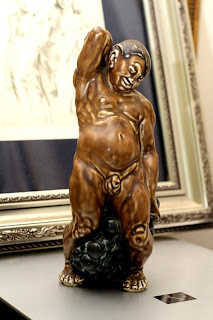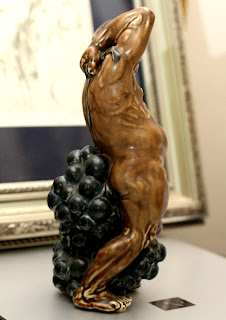











--------------------------------------




 Young Bacchus from the former East German porcelain factory Porzellanfabric Karl Ens by A. Berger, circa 1910. (Please see a previous post on this work)
Young Bacchus from the former East German porcelain factory Porzellanfabric Karl Ens by A. Berger, circa 1910. (Please see a previous post on this work) ------------------------------------------
The beautiful spring weather here is still in full swing. I have put down 250 lbs. of fertilizer and have trimmed hedges until I am beginning to look like a hedge. The honeysuckle is in full bloom and perfumes the entire yard. My resident hummingbirds are in hummingbird heaven. I still have a ton of work to do in the yard before I come inside when the heat and humidity of northern Florida take over so stay with me.
------------------------------------------
This beautiful Herend figure has a production date of 1941 but the design predates the production date. The Herend factory in Hungary dates from 1826 and holds Queens and Kings amongst its clientele. It is now the largest porcelain factory in Europe.
-------------------------------------------
Nude Youth with Flute:
-------------------------------------------






-----------------------------------------------------
Drunken Silenus:
----------------------------------------------------- 



Meet Drunken Silenus..... the great Roman god Bacchus' drinking buddy. In fact Silenus taught Bacchus the fine art of the consumption of wine. Many people confuse Silenus with Bacchus, but alas he is not the great god. This porcelain figure comes from a series portraying mythological personages. It dates from around 1900 and is my favorite. In Greek mythology, Silenus was a part bestial and part human creature of the forest and mountains. He was part of Dionysus' (Bacchus) entourage. The sileni are most usually represented as aged satyrs ---- drunken, jolly, fat, bald, beared, and possessing the ears of a donkey. According to some myths they were prophets but according to other sources they were so stupefied with drink that they were unable to distinguish truth from falsehood (think modern day politicians, especially of the Marxist-Democrat Party variety). Silenus was described as the oldest of the satyrs, the son of Hermes or Pan. He was the companion, advisor , and tutor of Dionysus (Bacchus). King Midas returned him to Bacchus after he got lost and earned that fateful wish of the golden touch. Silenus shared with the King a pessimistic philosophy:
"That the best thing for a man is not to be born, and if already born, to die as soon as possible."
------------------------------------------------------------







